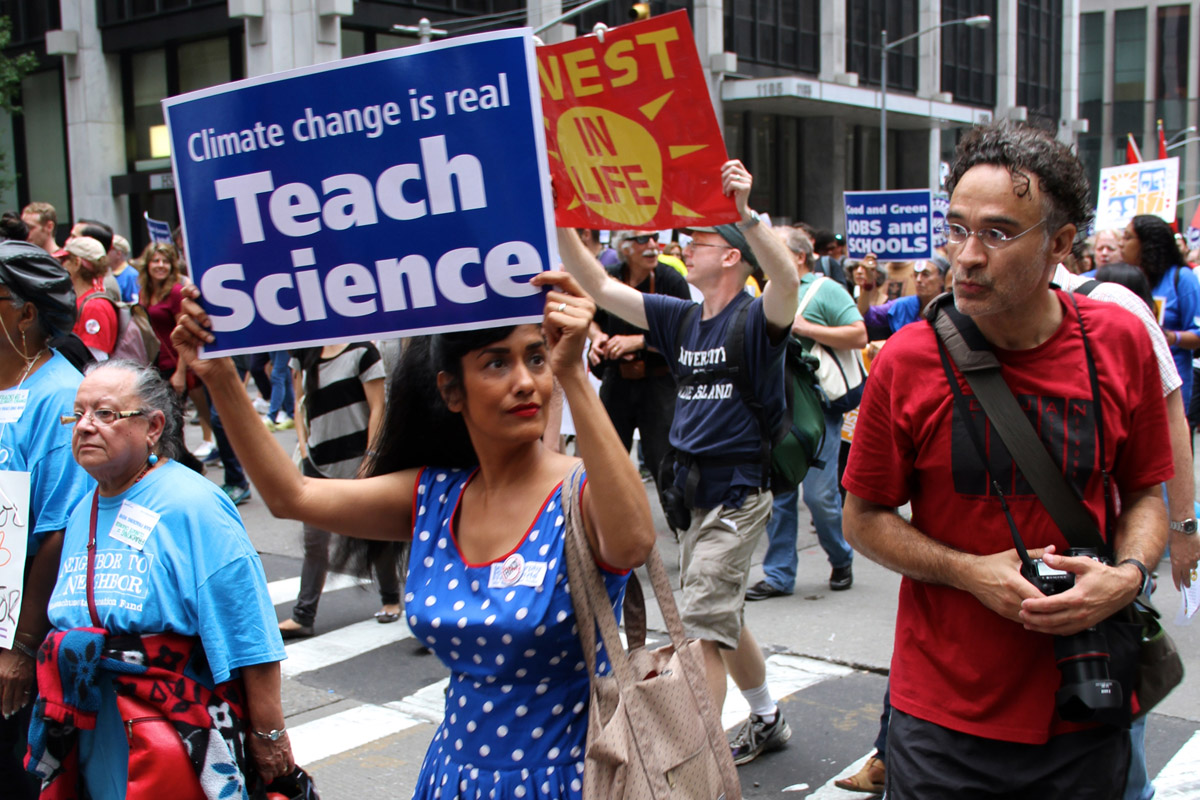So how—and what—are kids learning about climate change? Well, a survey published in the journal Science earlier this year revealed that students might not be taking home all that much from school. In fact, most science teachers spend just an hour or two on the subject every year.
But making climate change a classroom priority doesn’t always win you fans. Craig Whipkey works the subject into his science curriculum at Central Valley High School northwest of Pittsburgh and says he gets called things like “tree hugger” a lot.
“I had a student come up to me, and the young lady informed me that her dad was coming to pick her up, and [asked me], ‘Would I mind going somewhere else?’ because her dad didn’t like me very much.”
LISTEN: “Why Bringing Climate Change Into the Classroom is So Complicated”
Whipkey’s gotten used to it. Nearly 10 years ago, when he started teaching high school science, he trained with Al Gore’s Climate Reality Project. He brought what he was learning about climate science back to his students, who in turn, started taking it home. One parent, a leader in the local Republican Party, even wrote an editorial in the Beaver County Times complaining about Whipkey.
That’s when higher-ups within the Central Valley School District took notice and called him in to review his lesson plans.
“I was a second-year teacher, I was teaching a brand new course, and the administration wanted to look at my materials,” he says. “Absolutely, I was sweating.”
Other Pennsylvania science teachers have also been challenged for teaching about climate change. Many times, the issue has boiled over when a district is ordering new textbooks. Just last month, school board members in the Quakertown Community School District, near Philadelphia, refused to order the environmental science and oceanography books requested by the district’s administration. The board didn’t like that students would be taught climate change as a scientific fact. Those board members declined to comment for this story.
It was a similar story in Saucon Valley School District, south of Allentown. Bryan Eichfeld, a school board member there, calls climate change a hoax and a political issue. He wants textbooks that provide competing views.
“But that’s not what’s happening with climate change,” he says. “They are taking everything that they can to prove that there’s climate change and ignoring the data that disproves it.”
But Minda Berbeco, the policy director with the National Center for Science Education, takes issue with these kinds of calls for “balance.” There is near universal consensus among scientists that the climate is changing and that human activity is causing it.
“It’s really unfair not to teach kids the accurate science,” she says. “It’s really unfair to not demonstrate what the evidence shows and what the data shows.”
A survey published in the journal Science earlier this year revealed that students might not be learning much about climate change at school. In fact, most science teachers spend just an hour or two on the subject every year.
Berbeco says when school boards choose science textbooks, they’re really deciding how students will understand climate change. For example, when researchers took a look at four middle school science textbooks in California, they found a lot of wishy-washy language.
“It depicts scientists as unsure—so it’s ‘scientists think’ not ‘evidence shows,’” she says. “Students come away with a real misunderstanding of climate change. They think scientists are unsure about it. They think that there’s a controversy.”
Textbooks are only part of the challenge when it comes to teaching climate science in the classroom. David Evans, director of the National Association of Science Teachers, says the average teacher graduated in the 1990s. Many don’t know enough about climate change themselves and don’t feel confident teaching it.
“Honestly, 20 years ago, climate science—in fact, most environmental science—was not heavily featured in teacher preparation programs,” he says.
In Pennsylvania, the incentive to bring the subject into the curriculum is also low. Currently, the Biology Keystone Exam—a test that teachers must prepare their students to take—doesn’t address climate change. Meanwhile, across the country, many states have passed new science standards that include climate change.
“Treehugging” teacher Craig Whipkey says there are plenty of reasons teachers choose to skip the subject.
“I think ‘don’t rock the boat’ is the easiest path,” he says. “It doesn’t get a lot of press [when] it’s not in there, but it would get a lot of press if it was in there.”
Whipkey says it’s too bad, because young people will need to understand climate change to make informed decisions in the future. Still, he’s optimistic. He says the superintendent and school board members who gave him trouble when he first started teaching climate science ten years ago have all been replaced.



